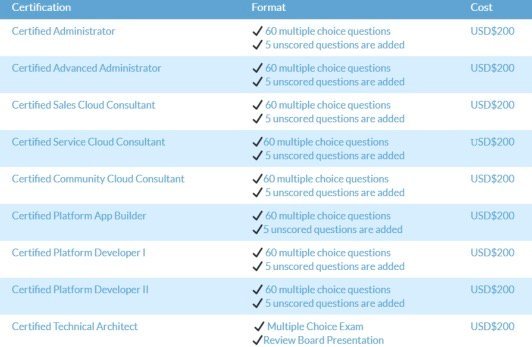Choosing a career path in the tech world can be confusing, but Salesforce offers a clear road to success. As the world’s #1 Customer Relationship Management (CRM) platform, it creates millions of jobs for professionals with the right skills. A Salesforce certification is the best way to prove your knowledge, boost your resume, and land a high-paying job. This guide will help you understand the different certifications and decide which one is right for you.
Why Should You Get a Salesforce Certification?
A Salesforce certification acts as an official stamp of approval that validates your skills and expertise. For anyone looking to start or advance their career in the Salesforce ecosystem, getting certified is a critical step. It provides a structured path for learning the platform’s vast capabilities.
Becoming certified makes you a more attractive candidate to employers. It shows you have the dedication and knowledge to handle complex CRM tasks. The Salesforce economy was expected to create 3.3 million jobs by 2022, and this demand continues to grow.
There are several key advantages to earning a certification:
- Marketability: It instantly increases your value in the IT job market, positioning you as a subject matter expert.
- Flexibility: You can prepare for the exams at your own pace. Whether it takes you a few days or a few months, you control your learning schedule.
- Career Growth: The more certifications you earn, the more in-demand you become. This often leads to better job opportunities and higher salary offers.
These benefits make the time and effort invested in certification a worthwhile endeavor for your professional development.
Understanding the Different Salesforce Career Paths
Salesforce doesn’t have a single, rigid hierarchy for its certifications. Instead, the credentials are designed to align with specific job roles within the industry. This allows you to focus on the area that best matches your skills and career goals.
Whether you are a project manager, a developer, or a marketing professional, there is a certification path for you. The main roles that Salesforce certifications cater to include Administrators, Developers, App Builders, Architects, Consultants, and Marketers.
Each path focuses on a different aspect of the Salesforce platform, from day-to-day management to building custom applications and designing large-scale solutions.
A Closer Look at Foundational Certifications
For those just starting, it’s helpful to understand the focus of the most common entry-level certifications. While each has a unique purpose, they all provide a strong foundation for a successful career. Choosing the right one depends on whether you prefer configuration, custom development, or a bit of both.
This certification is meant for professionals who build, design, deploy and customize apps in Force.com platform. The table below compares three popular starting points to help you decide.
| Certification | Ideal For | Key Skills Required |
|---|---|---|
| Salesforce Certified Administrator | Professionals who manage and maintain Salesforce applications. | User management, security, data, reports, and dashboards. |
| Salesforce Platform App Builder | Individuals who design and build custom applications without code. | Declarative development, application design, and automation. |
| Salesforce Platform Developer I | Developers who build custom apps with code. | Apex, Visualforce, data modeling, and business logic. |
Certifications for Salesforce Administrators
The Administrator path is one of the most popular starting points for a career in Salesforce. Administrators are the backbone of any company using the platform, ensuring it runs smoothly and meets business needs.
The first level is the Salesforce Certified Administrator. This certification is for professionals who handle the day-to-day management of Salesforce. Responsibilities include setting up new users, building reports and dashboards, and maintaining the security of the application.
For those with more experience, the Salesforce Certified Advanced Administrator is the next step. This certification is designed for administrators who have a deep understanding of Salesforce’s features. They are skilled in creating advanced reports, complex automation processes, and finding innovative ways to boost productivity using the platform.
Certifications for Developers and App Builders
If you enjoy building and customizing applications, the Developer or App Builder path might be for you. These roles focus on extending the functionality of Salesforce to meet specific business requirements.
The Salesforce Platform App Builder Certification is perfect for those who want to build apps using declarative tools, meaning little to no code is required. It focuses on the design, deployment, and customization of applications on the Force.com platform.
For those with programming skills, the Developer path offers two levels.
- Salesforce Certified Platform Developer I: This requires knowledge of building custom applications using Apex and Visualforce. You’ll need to understand how to design the data model, user interface, and security for these apps.
- Salesforce Certified Platform Developer II: This is for advanced programmers. Candidates must be able to design, develop, and deploy robust, reusable solutions for complex business logic on the Force.com platform.
Advanced Certs for Architects and Consultants
For seasoned professionals, Salesforce offers elite certifications that signify the highest level of expertise. These roles are responsible for designing and implementing large-scale, complex solutions.
The Salesforce Certified Technical Architect is one of the most prestigious credentials in the entire tech industry. To achieve it, candidates must demonstrate extensive experience, deep technical knowledge, and the ability to design and build robust solutions that span the entire Salesforce platform.
Another specialized path is the Salesforce Certified Sales Cloud Consultant. This certification validates your ability to design and implement Sales Cloud solutions effectively. It covers application and interface design, as well as managing analytics for tracking sales performance.
Job Outlook and Salary Expectations
The demand for skilled Salesforce professionals is incredibly high. A quick search on job sites like Glassdoor reveals thousands of open positions for administrators, developers, architects, and engineers. The job roles are not limited to technical fields, with many opportunities for project managers and program directors as well.
This high demand translates into excellent salary prospects. For example, according to Indeed.com, the average salary for a Salesforce Administrator in the US was $112,031 back in 2019, and these figures have continued to rise. Getting certified is a proven way to increase your earning potential.
Frequently Asked Questions about Salesforce Certifications
Which Salesforce certification is best for beginners?
The Salesforce Certified Administrator is widely considered the best starting point. It provides a comprehensive overview of the platform’s core features and is the foundation for many other specialized certifications.
Do I need programming skills for all Salesforce certs?
No, you do not. Certifications like the Administrator and Platform App Builder focus on declarative (point-and-click) development, requiring no coding knowledge. Developer certifications, however, do require programming skills in Apex and Visualforce.
How many questions are in a typical Salesforce exam?
Most Salesforce certification exams consist of 60 multiple-choice questions. The time allowed to complete the exam typically ranges from 90 to 120 minutes, depending on the specific certification.
Can I take the Salesforce certification exam online?
Yes, you can take the exams either online from your home or office or at an onsite testing center. You can sign up for an exam through Webassessor, which is managed by Kryterion Global Testing Solutions.
Is getting a Salesforce certification worth the effort?
Absolutely. A certification validates your skills, makes you more marketable to employers, and can lead to significant salary increases. It provides a structured learning path and proves your commitment to mastering the Salesforce platform.






Leave a Comment